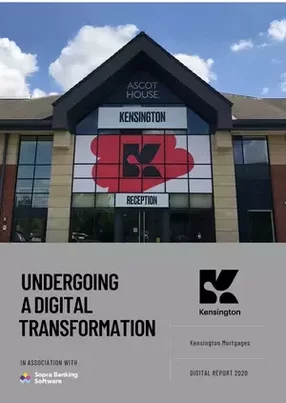Kensington Mortgages: undergoing a digital transformation
Kensington Mortgages is the largest independent mortgage lender in the UK and specialises in mortgages for borrowers with more complex income profiles – such as the self-employed or people with multiple sources of income – who find it difficult to get a mortgage from one of the High Street lenders.
Vicki Harris is the Chief Commercial Officer at Kensington Mortgages. Having joined the organisation in 2018, Harris is responsible for driving growth and innovation at the firm. Over the past few years, Harris believes her organisation has undergone not just a digital transformation but a business-wide one too. “When I joined, we took a step back and asked the question: what is the purpose of our organisation? We spent quite a lot of time understanding this and defining what makes us different - and from that, we updated our strategy and refreshed our brand and values,” she explains. “We then used that as the driving factor to kick off a range of initiatives across the business including building out our digital capabilities. A lot of it was around how we think about the business, our people and how we can be more agile in our decision-making. It was far broader than just digital, although that was a key part of it.”
On the digital side, Kensington Mortgages has been working very closely with SOPRA Banking Software to develop a new core platform. Unlike many of the older systems currently in use across the industry, it is built around a modular and flexible architecture that will allow the company to make changes to products, pricing and processes very rapidly. “It’s been a massive project that has finally gone live over the past few weeks. We are now working hard to build out a range of new and exciting products and refine our pricing approach accordingly.,” explains Harris. “We will gather lots more information as we look to underwrite new borrowing through things like open banking rather than expecting customers to provide months of bank statements. We now use APIs a lot more to access third party data. And we’re in the process of rebuilding our website so we can engage more directly with customers. I think the mortgage industry more generally is one of the few areas in retail financial services that hasn’t been disrupted yet but this is coming and we need to be ready for it.”
All of Kensington’s mortgages are analysed by VECTOR, which is a proprietary and powerful analytical model that is embedded into all phases of the mortgage lifecycle. “VECTOR has a massive database spanning the last 25 years with over a million data points showing how loans have behaved in different macroeconomic environments,” says Harris. “We have an AI platform that allows us to use VECTOR to help us understand how our loans will perform over time depending on different economic scenarios. This also gives us an edge to develop new products.”
Harris is well aware that mortgages generally are one of the last remaining areas that are yet to be innovated. “I saw a chart recently that showed in 1990, it took a week to buy an airline ticket, two weeks to get new house insurance and three weeks to get a car loan,” she explains. “But, all those things have moved from weeks to seconds as you do them online, whereas mortgages, which used to take days, are the one area where it now takes longer than it did before.
“People used to go to their bank branch more often, so back in the 90s if you wanted a mortgage you went to see your branch manager, you talked them through what you needed and they had the power to make a decision. It happened quite quickly because it was done locally, even though it wasn’t done digitally. However, what has happened over the past 15/20 years is that the bank has taken away that power from the branches, it’s all centralised and hasn’t been digitised. You go into some central process within the bank with people that don’t understand individual circumstances and you often end up with a ‘computer says no’ approach. Taking out a mortgage is a complex process, much more so than perhaps getting a car loan. You have to value the property and try to consider whether the person involved can sustain paying a mortgage for the next 25 years.”
As Kensington gears up to celebrate its 25th year anniversary in December, Harris is looking to the future and is optimistic about what the next few years will hold for her organisation and the industry itself. “I think it’s a really exciting time for the sector and we’re on the cusp of disruption,” she explains. “Kensington is currently growing at 30% year on year and we expect the growth of digital to only accelerate post-COVID. We also anticipate an increasing need for specialist mortgage lending as people’s financial situations become more complex.. Coming out of COVID, there are going to be a lot of people that were on furlough or had to take a payment holiday where it’s going to take more time to underwrite them. I think there will be a much more customer-focused approach and we have a number of new products in the pipeline to allow younger people to get on the housing ladder. Customers are demanding that we do things in different ways and it’s time to start addressing that. The future is bright.”


